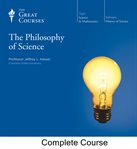Nonfiction
eAudiobook
Details
PUBLISHED
Made available through hoopla
EDITION
DESCRIPTION
1 online resource (1 audio file (1080 min.)) : digital
ISBN/ISSN
LANGUAGE
NOTES
Narrator not specified
Science can't be free of philosophy any more than baseball can be free of physics. With this bold intellectual swing for the fences, philosopher Jeffrey L. Kasser uses the tools of philosophy to launch an ambitious and exciting inquiry into what makes science science. The philosophy of science can be abstract and theoretical, but it is also surprisingly practical. Science plays a pivotal role in our society, and a rigorous study of its philosophical foundations sheds light on the ideas, methods, institutions, and habits of mind that have so astonishingly and successfully transformed our world. In these 36 stimulating lectures, you will investigate a range of philosophical approaches to science, including empiricism, constructivism, scientific realism, and Bayesianism. You'll also examine such concepts as natural kinds, bridge laws, Hume's fork, the covering-law model, the hypothetico-deductive model, and inference to the best explanation. Professor Kasser of Colorado State University shows how these and other tools allow us to take apart scientific arguments and examine their inner workings - all the while remaining an impartial guide as you navigate the arguments among different philosophers during the past 100 years. All Lectures: 1. Science and Philosophy 2. Popper and the Problem of Demarcation 3. Further Thoughts on Demarcation 4. Einstein, Measurement, and Meaning 5. Classical Empiricism 6. Logical Positivism and Verifiability 7. Logical Positivism, Science, and Meaning 8. Holism 9. Discovery and Justification 10. Induction as Illegitimate 11. Some Solutions and a New Riddle 12. Instances and Consequences 13. Kuhn and the Challenge of History 14. Revolutions and Rationality 15. Assessment of Kuhn 16. For and Against Method 17. Sociology, Postmodernism, and Science Wars 18. (How) Does Science Explain? 19. Putting the Cause Back in "Because" 20. Probability, Pragmatics, and Unification 21. Laws and Regularities 22. Laws and Necessity 23. Reduction and Progress 24. Reduction and Physicalism 25. New Views of Meaning and Reference 26. Scientific Realism 27. Success, Experience, and Explanation 28. Realism and Naturalism 29. Values and Objectivity 30. Probability 31. Bayesianism 32. Problems with Bayesianism 33. Entropy and Explanation 34. Species and Reality 35. The Elimination of Persons? 36. Philosophy and Science
Mode of access: World Wide Web







